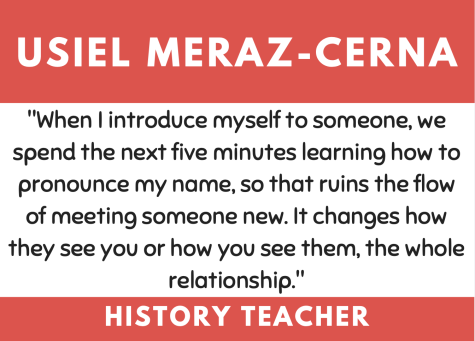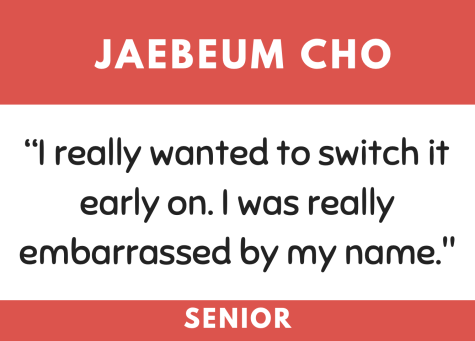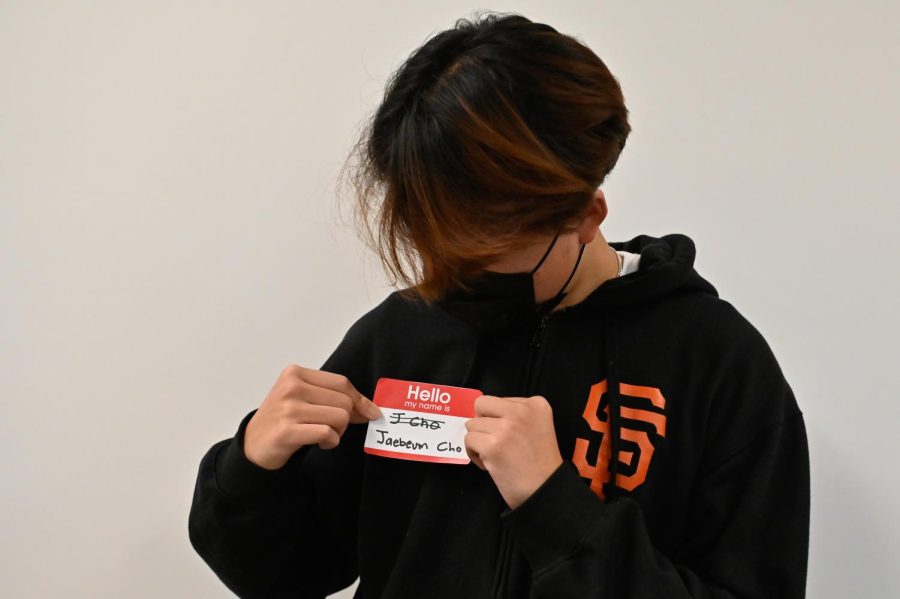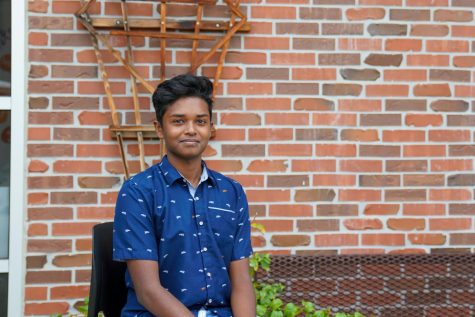Actually it’s pronounced…
Examining the struggles behind ethnic names in America
Senior Jaebeum Cho used to go by J. Cho to prevent mispronunciations, however after gaining appreciation for his name in recent years he has started going by Jaebeum.
December 27, 2022
“Our names are almost like the way we access the world, the way we access interacting with people,” History teacher Usiel Meraz-Cerna said. “I don’t wish I had a different name, but I guess I was jealous of people who had a simple name.”
Meraz-Cerna, who grew up in Oakland, has struggled with others mispronouncing his name since childhood. At school, his name, Usiel, was commonly mispronounced by teachers and classmates who, even after being corrected, would still get it wrong.
“I try to spend time when people ask me about my name, but even in those kinds of situations, I will encounter people who don’t care enough to learn how to say it right. And that makes me lose a little bit of respect for them,” Meraz-Cerna said.
Senior Anika Lin had faced a similar issue. Although she does not blame people she meets for mispronouncing her name in her first few interactions with them, she believes that correct pronunciation should matter.
“When you’re introducing yourself to someone you should emphasize your pronunciation and maybe for the first few times you meet that person,” Lin said. “It’s probably a good reminder to let them know how to pronounce your name, but I feel like after that, if that person constantly interacts with you, it’s their responsibility to learn how to say your name.”
Although correcting people may be important, Lin admits that it is not easy. Lin says that allowing people to mispronounce her name feels easier than actually correcting the person. Meraz-Cerna agrees — he believes that often, especially when meeting new people, it’s easier to just not correct someone because of the way it changes the dynamic of the conversation and consequently the following relationship.
“When I introduce myself to someone, we spend the next five minutes learning how to pronounce my name, so that ruins the flow of meeting someone new. It changes how they see you or how you see them, the whole relationship,” Meraz-Cerna said. “Any kind of relationship: friendship, working relationship, romantic relationship. It changes the way we interact because now we’re talking about my name instead of something else.”

These interactions often lead to feelings of embarrassment. Senior Akanksha Varanasi recounts “complaining to [her] mom” about people constantly mispronouncing her name. She says that people with hard-to-pronounce names commonly refrain from correcting others because of a combination of embarrassment, fear and intimidation.
“I had a teacher in eighth grade who called me Anushka for a whole year and I was too scared to correct her,” Varanasi said. “She was just really terrifying and I didn’t want to make it a big deal because I didn’t want to confront her.”
For Varanasi, however, the feelings of embarrassment didn’t stop there. The constant necessity to have to correct people’s mispronunciations and the difficulty associated with it made her embarrassed about her name itself.
“I remember, people would just constantly mispronounce my name,” Varanasi said. “Sometimes they do it even for fun, especially in elementary school and middle school, sometimes, wishing I had a different name.”
Senior Jaebeum Cho says he has also been embarrassed by his unique name because it is difficult to pronounce, and he adds that he often changes the way he introduces himself to make it easier for others.
“I really wanted to switch it early on. I was really embarrassed by my name. I didn’t like writing [it] out so I used to write my name is J Cho,” Cho said. “I also don’t say my name sometimes. Like even when I get called on to introduce myself, I sometimes don’t say my name: I go really fast with my name so no one can really hear.”

Regardless of these tricks to save him from confrontation, Cho has encountered scenarios where correcting someone has become unavoidable. One example was when he worked as an intern at Kaiser Permanente, where everyone but his advisor was able to pronounce his name correctly.
“I told all the other people that were my friends there,” Cho said. “I just taught [the advisor] eventually because I felt bad because I knew she would get embarrassed if I didn’t tell her.”
Cho, however, has also encountered the opposite, where people like his parents who say it correctly, question why “the way [he] wants it to be said by his friends” is different from the pronunciation they gave him. Although his parents may be confused by it, Cho says that he “likes it” due to the fact that it is “kind of simple” and easier for people to pronounce.
Lin also deals with the same issue — her name is pronounced differently at school and by people outside of her family, than the way it is pronounced at home. Her friends know as well and often joke about changing their pronunciation to the correct pronunciation, though they always end up reverting to the wrong pronunciation because that is what they have been calling her for many years. To Lin, the issue stems from the fact that she has been going by the incorrect pronunciation for so long.
“I do wish people would call me [the correct pronunciation],” Lin said. “But everyone’s so used to calling me [the incorrect pronunciation] that even if people are like, ‘I’m gonna pronounce your name [as the correct pronunciation],’ they usually switch back to what everyone calls me.”
For Lin, changing the pronunciation she goes by at school is no longer a realistic option. Having already gone by the incorrect pronunciation of her name for many years, it is difficult to ask new people she meets to pronounce it right as it may cause confusion.
“I introduce myself as [the incorrect pronunciation] instead of [the correct pronunciation], just because it’d be weird like if I walked into one classroom and was like, ‘Oh I want my name pronounced [the correct pronunciation],’ but everyone else knows me as [the incorrect pronunciation],” Lin said.
However, Lin does plan to correct the pronunciation of her name once she goes to college. With college being a “fresh new start,” Lin wants to go by the pronunciation that her parents gave her, and she “hopes that it will stick.”
Indeed, major moves offer people the chance to fix the pronunciation of their names. When sophomore Lilja Kiiski moved from Finland to Ireland early in her childhood, she went by the nickname “Lilly.” Lilja believes that her parents gave her the nickname while they lived in Ireland to make her name easier to pronounce. However when she moved to America in the fourth grade, Kiiski chose to go back being called her original name.
“I honestly really didn’t feel a super connection to the name Lilly. I didn’t like it as much as my original name Lilja.” Kiiski said. “I think I’ve always preferred the name Lilja.”
Despite the difficulties associated with their names, Lin, Cho, Varanasi and Cerna all believe that their names make up an integral part of their identity, and they are proud of their names.
After years of being embarrassed by his name, sometimes even wishing for a simpler one, Cho has recently come to appreciate it. Cho feels as though dissecting the topic in an advisory lesson helped him turn his feelings of embarrassment into pride.
“I think I didn’t give it a chance because I thought people found it really hard,” Cho said. “I didn’t like [it] when people said it wrong, but I gave it a chance and made a change and everyone says my name right now, so I’m happy with it.”




















